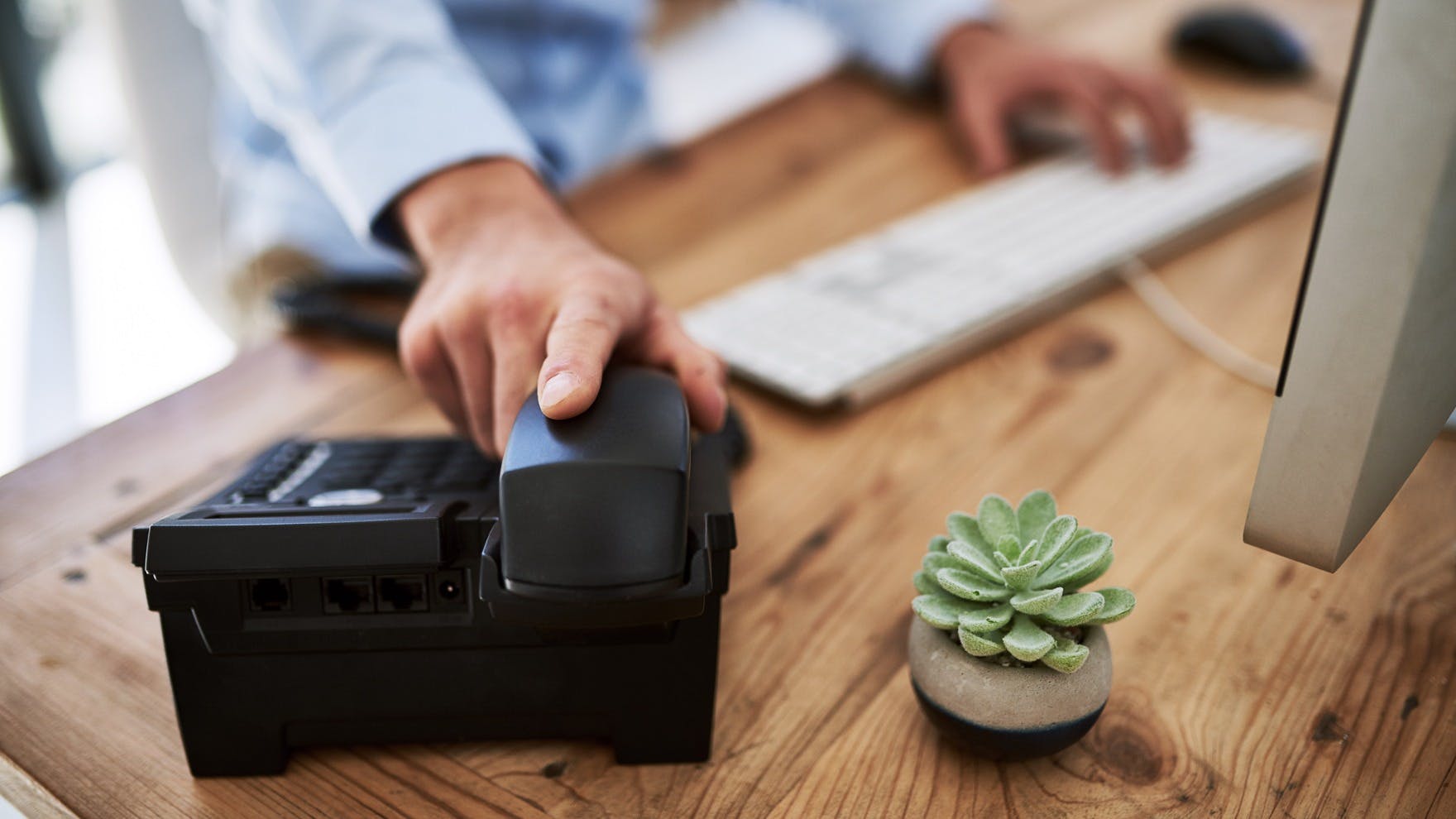Closing the Call in Sales: 20 Best Call-Closing Statements
Casey O'Connor
Closing the call in sales is almost as important as qualifying a lead or pitching your offer.
Call closing — that is, the timing and/or verbiage within a conversation that indicates a sales call is about to end — can be delicate and nuanced, and the words you choose can make or break how the rest of the sales opportunity plays out.
In this article, we’ll go over everything you need to know about closing the call, including why it’s so important to get right, 20 effective examples, and some important etiquette tips to keep in mind as you practice.
Here’s what we’ll cover:
- What Is a Call-Closing Statement?
- Why Closing the Call Professionally in Sales Is Important
- 20 Best Call-Closing Statements
- Tips for Closing the Call Effectively
- 4 Call-Closing Etiquette Rules
What Is a Call-Closing Statement?
A call-closing statement is a specific phrase or words that sales and customer service reps say towards the end of a phone call that indicates to both parties that the call is coming to an end.
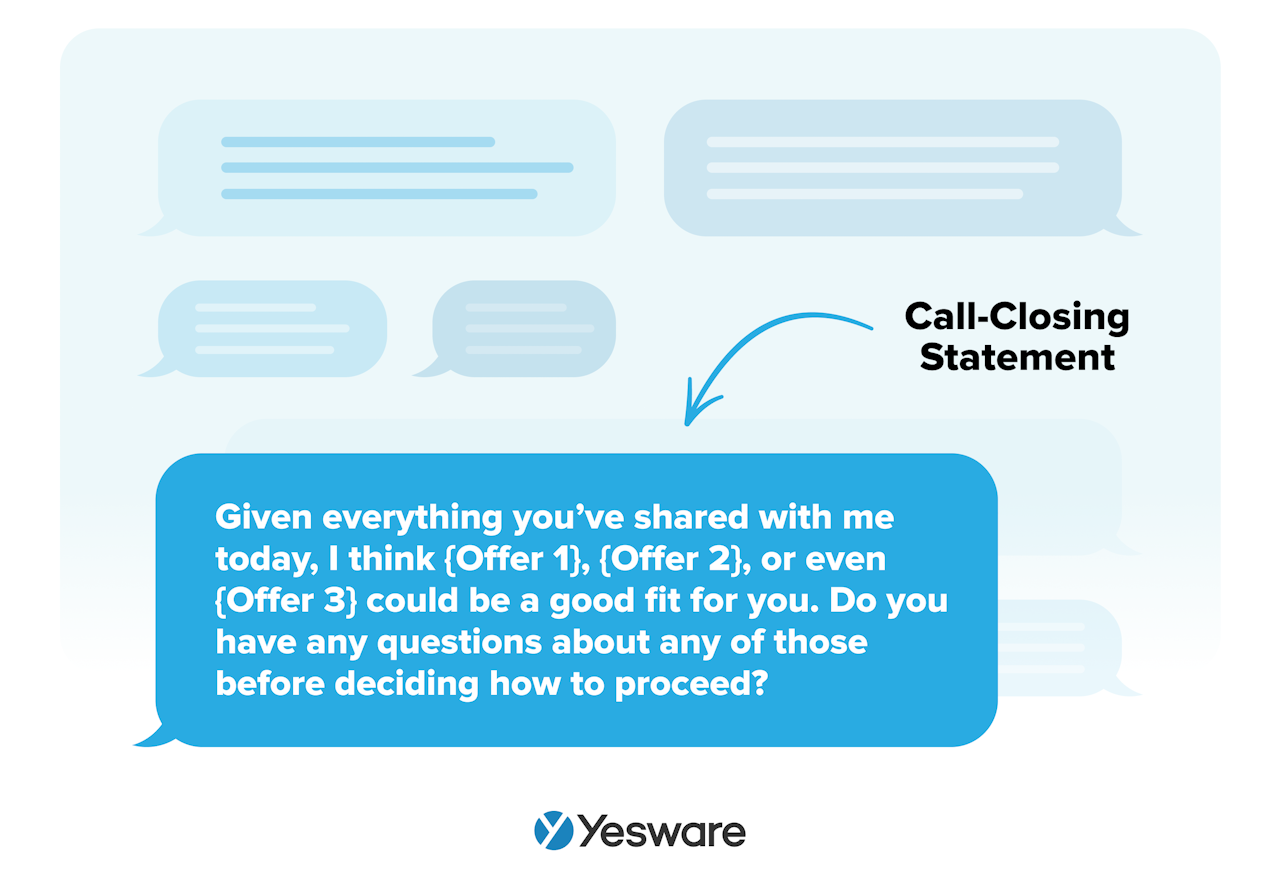
Knowing how to close a call can bring some control to cold calls, which can sometimes otherwise be difficult to predict.
An effective closing call statement can help the person on the other end of the call feel heard and understood, fill in any information gaps, help guide them toward a decision about the next steps, and end the call on a positive note.
Why Closing the Call Professionally in Sales Is Important
Closing a call with a professional call-closing statement is very important, especially for phone-based sales reps or telephone customer service representatives.
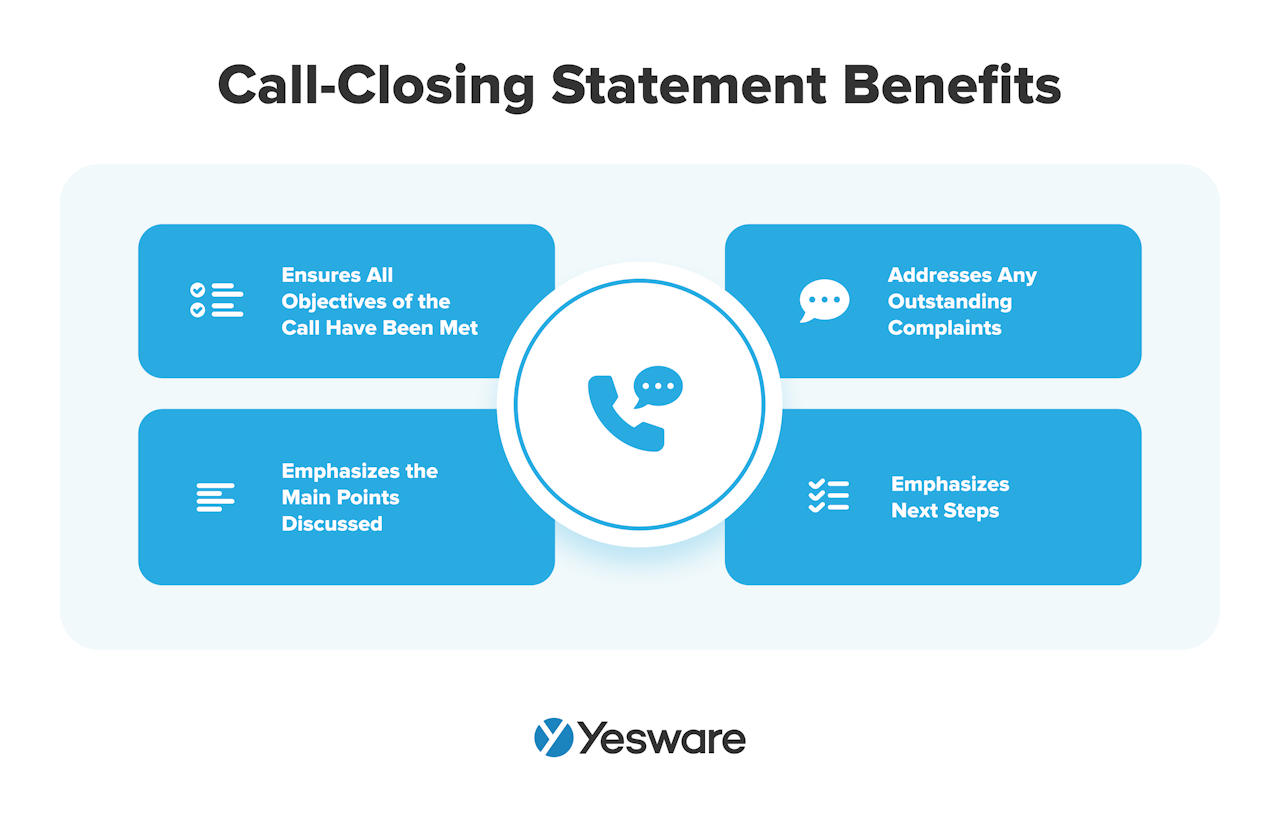 A call-closing statement helps ensure that all of the major objectives of the call have been met. It gives the seller an opportunity to summarize the call, ask or answer any final questions, address any outstanding complaints, and talk about the next steps.
A call-closing statement helps ensure that all of the major objectives of the call have been met. It gives the seller an opportunity to summarize the call, ask or answer any final questions, address any outstanding complaints, and talk about the next steps.
Closing a call the right way shows buyers that you value their time and that you can competently lead a sale. It helps ensure sales reps are leading sales conversations with politeness, professionalism, and positivity.
The right call-closing statement encourages brand awareness and loyalty and subsequently promotes repeat business and referrals.
20 Best Call-Closing Statements
The right call-closing statement will be highly dependent on the unique circumstances of the specific call, the personality and preferences of the speaker and the person on the other end, and the ins and outs of your overall sales process.
There are words or statements that sales reps can use to close the call in just about any sales scenario: addressing complaints, scheduling meetings or appointments, confirming orders, answering questions, following up on leads, etc.
Here are 20 of the best call-closing statements to try on your next sales call.
1. I want to make sure you’re aware that this offer is only available until {Date}. I’d love to help you get signed up today so you don’t miss out.
This is one example of what’s known as a “Time Sensitive” call-closing statement. It can help create a feeling of urgency and encourage the buyer to decide right then and there, rather than delay.
2. Given everything you’ve shared with me today, I think {Offer 1}, {Offer 2}, or even {Offer 3} could be a good fit for you. Do you have any questions about any of those before deciding how to proceed?
In the “Options” close, you remove the buyer’s ability to answer with a simple “yes” or “no,” and instead steer them to decide between three desirable options.
(Just make sure that the choices you present do, in fact, represent a good fit for the prospect on the other end. Losing the deal is preferable to trapping someone into a poor-fit offer.)
3. I think I can come down on the cost to meet your budget, but only if you can sign today.
This type of negotiation-based closing statement is known as an “Added Bonus” or a “Sharp Angle” close. The “Sharp Angle” close framework is: “If I…will you…?”
Sales reps can use this framework to close the call when a customer is asking for something specific that the rep can use as leverage to make the deal more lucrative or accessible.
4. I know this is a great fit for you and I’m as eager to see {Prospect’s company’s} results as you are. I’ll tell you what — if you sign today, I can give you {Discount}. Shall I get started on the paperwork?
This is called a “Deal” close, and sales reps should only use it when they know they have the authority to offer discounts or apply promotional rates to an offer. This is similar to an “Added Bonus” close, but in this case, the sales rep pre-emptively offers a discount in order to tip the scales.
5. Let’s go ahead and process your payment while I get started on your paperwork.
The “Assumptive” close can come across as a bit forward and should be reserved for situations in which sales reps are certain the prospect is ready to buy.
An “Assumptive” close is extremely confident; anyone using it needs to have done thorough research on their buyer persona and the prospect’s unique needs to ensure the offer is an exceptional fit.
6. It’s been great talking to you over the course of this week! I hope you’ll give me a moment to summarize what we discussed — you’re looking for a product with {X, Y, and Z} by {Date}. We talked about a few different options that could work for you — {Option A}, {Option B}, {Option C}. Have I got all of that right?
The “Summary” close is an effective option because it helps the buyer and seller end the call on the same page and gives both parties a final opportunity to ask/answer any questions.
If you use a “Summary” call-closing statement approach, make sure you keep your summarizing statements succinct.
7. Is there anything else I can help you with today?
This close usually implies that the primary objective of the call has been met and that it’s time to start saying goodbye. It gives the person on the other end a chance to communicate any final thoughts or ask any lingering questions.
8. Thanks for calling {Your company}. Have a great day!
This call-closing statement is direct and polite and helps keep your company at the top of the caller’s mind.
9. Goodbye {Name}, thanks for calling!
According to human behavior expert Dale Carnegie, author of the worldwide best-seller How to Win Friends and Influence People, “A person’s name is to that person the sweetest and most important sound in any language.”
When you use the listener’s name when closing the call, it helps end the conversation on a subconsciously positive note.
10. Once again, my name is {Your name}. Thank you for calling, have a great day!
Conversely, you might also opt to include your own name in your call-closing statement. This can make a lasting impression and helps the listener remember who you are.
Tip: Are you making enough calls in your day? Check out our free tool below to find out.
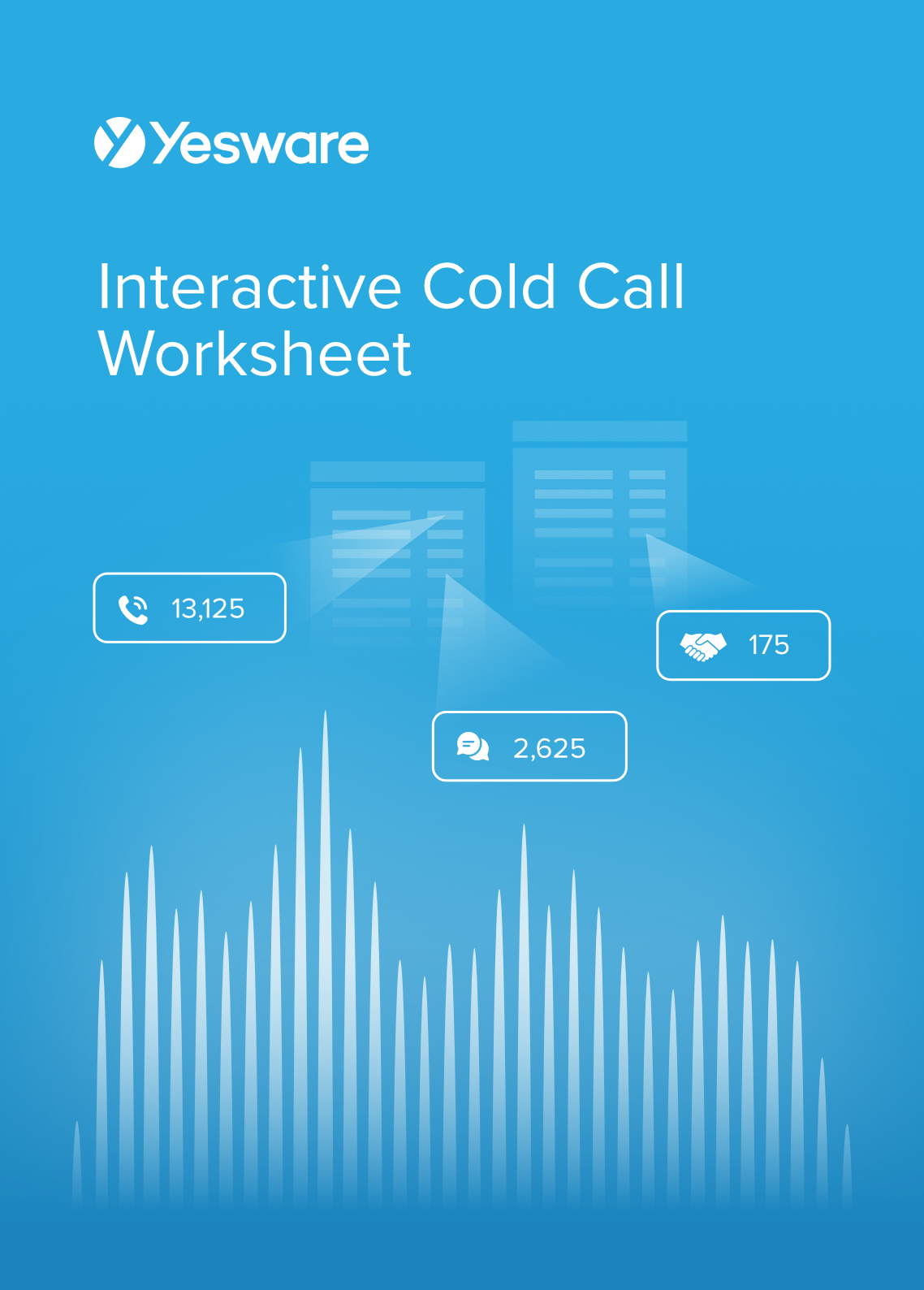 Interactive Cold Call WorksheetFully customizable worksheet that pinpoints roughly how many cold calls you need to make each day and in total for the month in order to hit your quota.
Interactive Cold Call WorksheetFully customizable worksheet that pinpoints roughly how many cold calls you need to make each day and in total for the month in order to hit your quota.
11. I enjoyed talking with you today!
This subtle compliment leaves the listener feeling warm and appreciated after they hang up with you, which can leave a lasting positive impression throughout the day.
12. We appreciate your business!
Customers like to know that they are valued. This call-closing statement shows the listener on the other end of the line that they are important and that you don’t take their loyalty lightly.
13. I’m happy we could resolve this for you.
Sometimes customers or prospects will call with complaints. While this isn’t ideal, it’s also not uncommon, and sales reps need to be prepared with call-closing statements for conversations that aren’t necessarily positive.
“I’m happy we could resolve this for you” (or its alternative, “I’m glad we could make this right for you”) are both professional ways to reassure the other person that you can handle their concerns with competence and care.
14. Thank you for calling, we appreciate you!
Sometimes, the best approach is a direct one. It’s always okay to tell the person on the other line that you appreciate them and are happy to have the chance to talk with them.
15. Thank you for calling! Please don’t hesitate to call again with any other questions or concerns.
A good call-closing statement can be an effective way to keep lines of communication open, even if the call is ending for the time being. Sales reps can remind callers that they are always welcome to call back if the need arises.
16. You’re all set for your {Time} appointment on {Date}. Is there anything else we can do for you today?
Sometimes sales reps need to end calls in which future appointments are set. If that’s the case, it’s a good idea to close the call with a reminder about the agreed-upon date and time for the next appointment.
17. My apologies again for any inconvenience this issue caused you.
A direct apology is another effective way to close a call that dealt with complaints or other negative circumstances.
Oftentimes, disgruntled customers just need to hear that you care, and an apology is a great way to show that. Just make sure it’s genuine.
18. Thank you for bringing that to my attention, I’ll pass it along to the appropriate party.
Sometimes, sales reps may field calls that are ultimately best addressed by someone else. Even if that’s the case, it’s still important that the call ends in a professional and helpful manner. This call-closing statement can help the caller feel assured that their concern will be heard.
19. I’ve escalated your concern to the appropriate party. You’ll be receiving a phone call from them in the next 24 – 48 hours.
If the caller is very agitated, and you’re unable to help them, you may want to offer them a tangible timeframe in which to expect support. This can help prevent emotions from escalating while the concern is passed to the appropriate person.
20. It was great chatting today! You can expect a {Call/Email} from {Person} sometime in the next day or so.
If your call was successful, your objectives have been met, and you’re ready to wrap it up, you might consider closing it by communicating the next steps. This helps the caller know that they’re in good hands and what to expect next in the process.
There are virtually limitless phrases that sales reps can use to close the call. Remember to choose ones that fit both your personality and the overall tone of the call.
See more here: 22 Sales Closing Phrases.
Tips for Closing the Call Effectively
The following tips will help you close the call effectively, no matter the scenario.
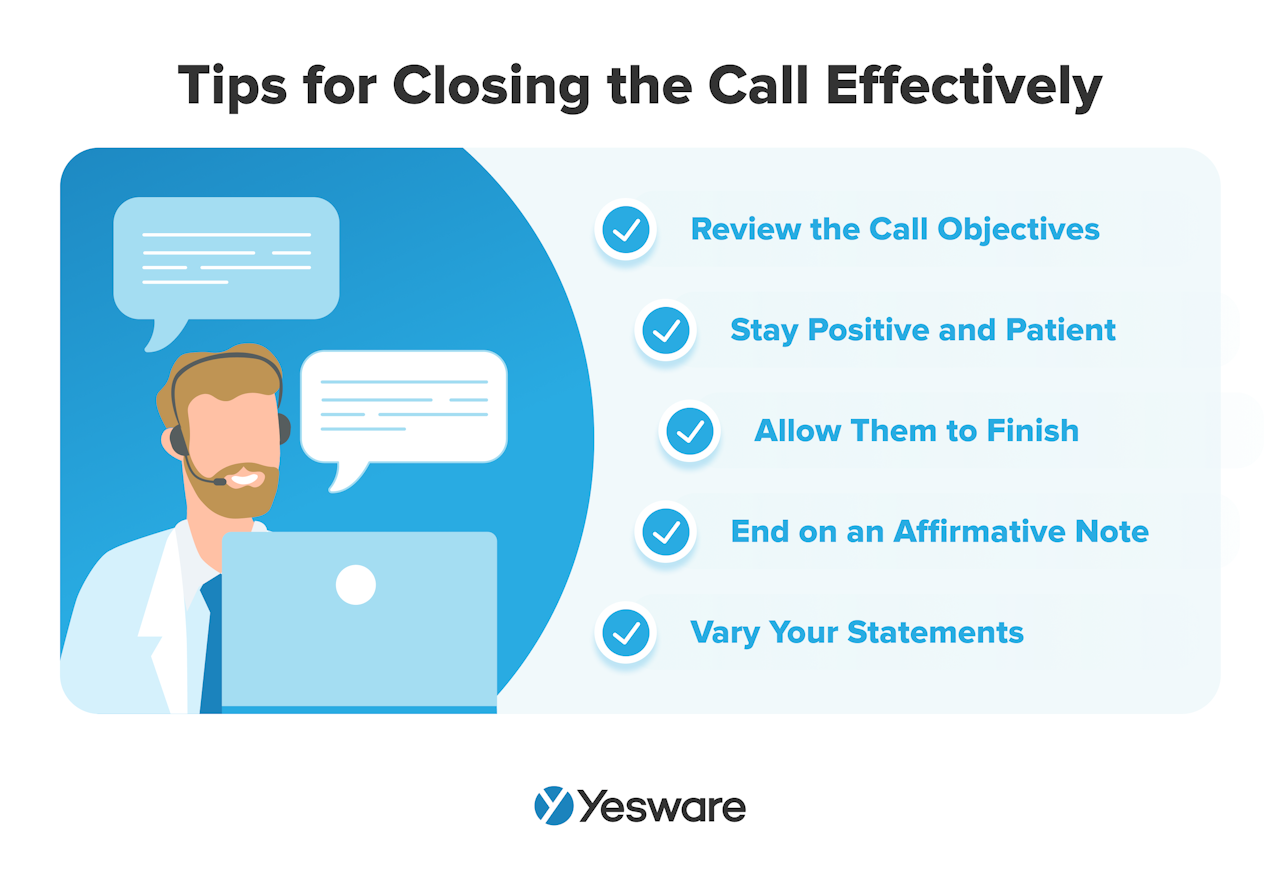
Review the Call Objectives
Always make sure you address the primary purpose of the call before closing. Review your agenda or mental notes as you’re getting ready to close to ensure that you’ve covered everything important.
Stay Positive and Patient
An effective call-closing statement is always positive, professional, and polite. Try to stay upbeat, to the best of your ability (even during complaint calls).
There’s some nuance here — don’t be overly enthusiastic if the caller is incredibly upset — but in general, it’s best to err on the side of positivity.
Allow Them to Finish
A sales rep’s rule of thumb should be to listen more than they talk, and phone calls are no exception.
Before closing the call, it’s imperative that sales reps make sure they’ve given the buyer a chance to say everything they need to say. If time is a factor, and you sense they’re not finished, you can always offer them alternative times and/or forums for continued conversation.
End on an Affirmative Note
This is a bit different than keeping a positive tone. If you can, try to end the call with the other person saying “yes” rather than “no.”
For example, you might say “Have we answered all of your questions today?” (Yes) instead of “Is there anything else I can help you with today?” (No).
It’s subtle, but some people believe that this has a subconscious positive effect on the speaker.
Vary Your Statements
This should go without saying, but it’s important to vary your call-closing statements. Not every phrase is right for every scenario or caller. Have a few in your back pocket that you’ve rehearsed and feel comfortable with, and vary them among your sales calls.
4 Call-Closing Etiquette Rules
Closing the call isn’t rocket science; it’s pretty straightforward once you find a few call-closing statements that feel natural. Here are four etiquette rules to keep in mind as you determine which works best for you.
Offer a Summary
If time allows, take a couple of minutes toward the end of the call to summarize what was discussed. Not only does this help keep you both on the same page, but it also shows that you listened carefully and can process and organize your thoughts quickly, which makes you appear more competent.
Describe Next Steps
Some phone calls require the next steps. It’s up to the seller to describe them in full to the caller. This may mean setting up a calendar appointment, sending an email, creating an account, or any number of tasks.
If they’ll be hearing from someone else in your organization, make sure you share their name and what to expect when they speak.
The sales rep needs to be the leader in describing the next part of the process.
Again: not only does this keep everyone logistically organized, but it also demonstrates competency and confidence.
Round up the Last Questions or Concerns
Always give the caller one last opportunity to ask any final questions or share any lingering concerns or sales objections before the call ends. This is usually just to cover your own bases, but in some cases, it may save an additional unnecessary phone call.
Set Your Own Time Limit
Although it’s usually the buyer who’s more vocal about time constraints than the seller, it’s important for sales reps to set their own internal time limit for each call. Even callers who don’t express a need for efficiency won’t be happy with reps who take too much of their time. Make sure you have a sense of the general timeframe required for each call on your agenda, and stick to it.
Do you have any favorite call closing statements? Which do you use for your trickiest sales calls?
Get sales tips and strategies delivered straight to your inbox.
Yesware will help you generate more sales right from your inbox. Try our Outlook add-on or Gmail Chrome extension for free, forever!
Related Articles
Anya Vitko
Anya Vitko
Anya Vitko
Sales, deal management, and communication tips for your inbox
